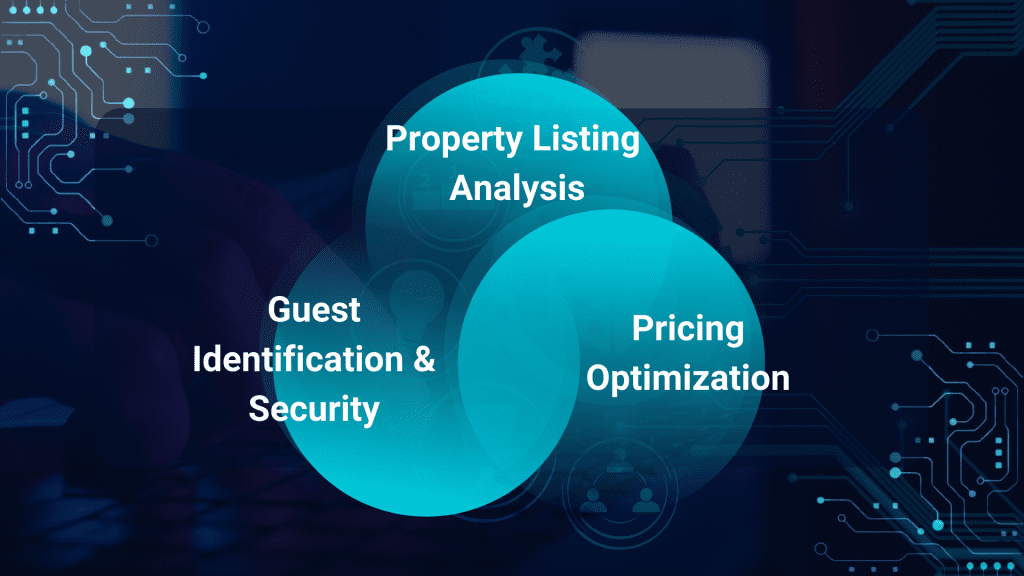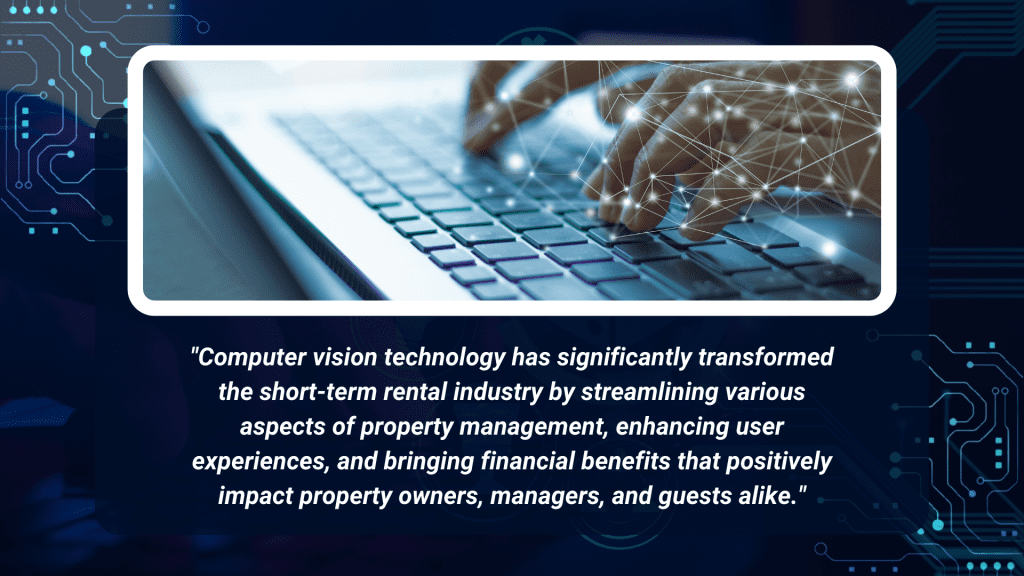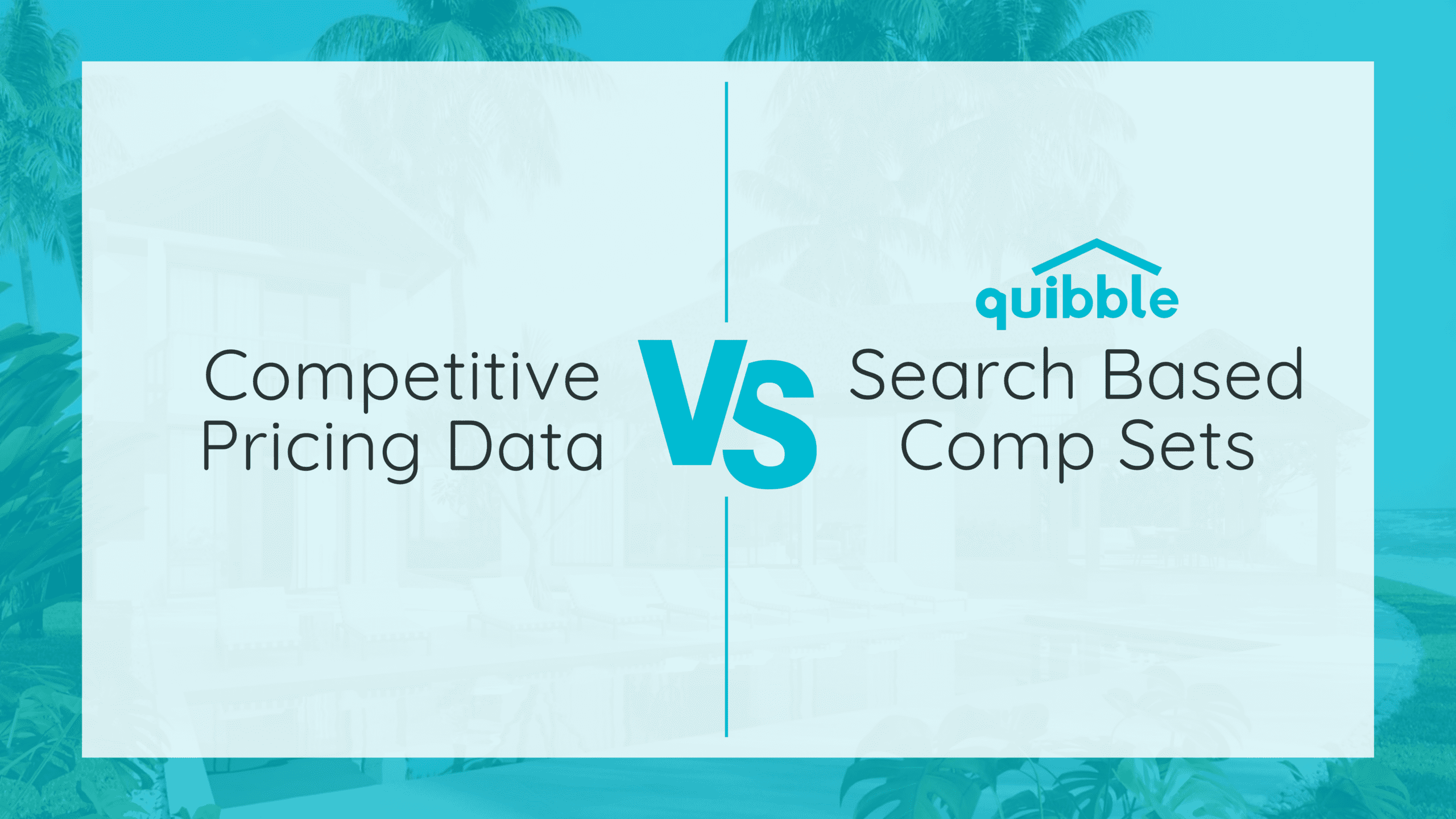Introduction to Computer Vision
Computer vision technology has emerged as a game-changer in various industries, revolutionizing the way tasks are accomplished and streamlining processes for efficiency. Computer vision is a field of artificial intelligence that focuses on the analysis and interpretation of digital images and videos. By using advanced algorithms to interpret the visual data captured by cameras, computer vision technology can automatically detect and track objects, identify people and objects, and generate metadata about the scene.
In an era where technology is continually transforming industries, computer vision has emerged as a groundbreaking innovation, shaping the future of the short-term rental market. This blog post will explore the exciting world of computer vision and its incredible potential to revolutionize the short-term rental industry. From improving property listings and pricing optimization to delivering a personalized guest experience, computer vision is set to change the game. So buckle up and get ready to discover how this cutting-edge technology can transform your short-term rental business!
“In an era where technology is continually transforming industries, computer vision has emerged as a groundbreaking innovation, shaping the future of the short-term rental market.”
Applications of Computer Vision in the Short-Term Rental Industry

✅ Property listing analysis
The application of computer vision in the short-term rental industry has immense potential in revolutionizing property listing analysis. This combination of image processing techniques not only improves the overall user experience but also adds value to short-term rental platforms by increasing booking conversions and customer satisfaction.
- Image recognition for categorizing listings – The integration of computer vision brings forth numerous advantages in leveraging image and video recognition capabilities while enhancing user experiences. By utilizing advanced image recognition techniques, computer vision can efficiently categorize properties based on various attributes such as property type, room layout, or amenities, giving potential renters a more efficient and accurate search experience. This automated categorization ultimately allows potential guests and property managers to find and compare suitable accommodations more effectively.
- Enhancing property photos for better visuals – computer vision can enhance property photos by identifying sub-optimal lighting, unappealing colors, or other visual issues that can negatively impact a listing’s attractiveness. Advanced image processing techniques can be used to enhance property photos, making them more visually appealing by adjusting lighting, contrast, and sharpness. By automatically refining these images, the technology provides a more enticing visual representation of the property that can increase booking rates and overall customer satisfaction.
✅ Guest identification and security
The integration of facial recognition in the short-term rental industry will optimize property management operations while prioritizing both user convenience and safety. It allows property managers to respond swiftly to potential security breaches or violations of rental agreements, ensuring the safety of their properties and maintaining a high standard of service for genuine guests. This innovative approach not only elevates the standards of the rental industry but also provides a modernized solution that is both efficient and user-friendly.
- Facial recognition for check-in/check-out processes – utilizing advanced facial recognition algorithms, this technology can quickly and accurately identify guests as they arrive at the rental, streamlining access to the property while also reducing instances of identity fraud. By automating these procedures, property owners can effectively screen guests and confirm their identities, leading to increased security and convenience for both parties.
- Monitoring unauthorized access and activities during a stay – leveraging advanced algorithms and real-time data analysis, property owners can ensure the security and overall experience of their renters. Solutions such as automated surveillance cameras, smart locks, and motion detectors can be easily integrated into rental properties to automatically detect unusual activities or unauthorized entries. Furthermore, computer vision technology provides privacy-friendly monitoring options that help maintain the trust and comfort of guests while still protecting property owners’ interests. Consequently, implementing computer vision systems in short-term rentals paves the way for a safe, secure, and optimized lodging experience for both guests and property managers.
✅ Pricing optimization
The use of computer vision technology empowers short-term rental businesses to adapt swiftly to the ever-changing consumer landscape and harness the power of dynamic pricing in driving success. Quibble uses insights gained from computer vision in implementing dynamic pricing strategies. Since 2020, our expertise in assisting property management companies to boost their revenue has been evident. With our extensive knowledge and commitment, we ensure that every last cent is extracted from your vacation rentals. Our distinguished track record showcases an average revenue increase of 30% for our clients—an exceptional feat we would be delighted to replicate for you! Learn more about us here: https://quibblerm.com/why-quibble/
- Visual analysis of property interior and exterior for price adjustments – extracting relevant data from images, computer vision can identify factors such as property quality, room size, amenities, and attractive views that contribute to the perceived value of a rental property. This information allows software to price their rentals competitively based on real-time market trends and nuanced visual characteristics. Furthermore, computer vision can assess the appeal of nearby competitors and facilities like parks, restaurants, and tourist attractions, ultimately helping property owners make data-driven decisions for strategic rental pricing and maximizing profits.
- Comparison with other properties in the area using visual data – by leveraging artificial intelligence algorithms, it becomes possible to analyze property images, assess their quality, and decipher specific features like size, interior design, or amenities. This information can then be compared with market data, allowing software and managers to make informed decisions about rental prices that take into account factors such as quality, location, and competition. Moreover, computer vision can continually update pricing models based on real-time data, ensuring an accurate understanding of the market landscape while maximizing returns on rentals for both property owners and guests.
“By planning and budgeting for the future, you can ensure that your money is being used as effectively and efficiently as possible.”
💎 Conclusion

In conclusion, computer vision technology has significantly transformed the short-term rental industry by streamlining various aspects of property management and enhancing user experiences. Through image recognition, it is now possible to categorize listings more effectively and evaluate the quality of the property, allowing potential renters to find suitable accommodations easily. By enhancing property photos with better visuals, computer vision helps in attracting more clients and increasing booking rates. Facial recognition technology has improved the check-in and check-out processes by offering a secure and personalized experience for guests.
Its profound impact on automating processes not only reduces operational costs for rental platforms but also optimizes guest satisfaction by tailoring experiences according to individual preferences. Drawing attention to the indisputable significance of harnessing computer vision technology, it is crucial for industry leaders to invest in research and development to unlock new opportunities and create unparalleled offerings that cater to the evolving demands of the short-term rental landscape.
Furthermore, monitoring unauthorized access and activities during a stay has become feasible thanks to advanced video analytics. Lastly, computer vision’s ability to analyze various data points contributes to pricing optimization, ensuring a competitive edge for property owners while providing affordable options to renters. Overall, the deployment of computer vision technology in the short-term rental space brings diverse benefits that positively impact property owners, managers, and guests alike.
Join our newsletter
Dominate the short-term rental market with cutting-edge trends









